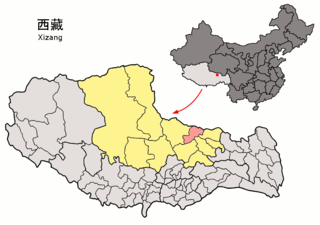
The Tao Te Ching, also known by its pinyin romanization Dao De Jing, is a Chinese classic text traditionally credited to the 6th-century BC sage Laozi. The text's authorship, date of composition and date of compilation are debated. The oldest excavated portion dates back to the late 4th century BC, but modern scholarship dates other parts of the text as having been written—or at least compiled—later than the earliest portions of the Zhuangzi.

Laozi, also rendered as Lao Tzu and Lao-Tze, was an ancient Chinese philosopher and writer. He is the reputed author of the Tao Te Ching, the founder of philosophical Taoism, and a deity in religious Taoism and traditional Chinese religions.
Eight Immortals from Sichuan are eight Sichuanese who supposedly became xian. The term is first used by Qiao Xiu in Record of Shu written in Jin Dynasty.

The Western Liang was a state of the Sixteen Kingdoms in China, one of the "Five Liang" of this era. Western Liang was founded by the Li family of the Han Chinese. The founder of the Tang Dynasty, Li Yuan, traced his patrilineal ancestry to the Western Liang rulers, and traced the ancestry of the Western Liang rulers to Li Guang and Laozi in the paternal line. The Li family of Western Liang were known as the Longxi Li lineage (隴西李氏).
The Mohe, Malgal, or Mogher, maybe a mispronunciation of the word Mojie, were a Tungusic people who lived primarily in modern Northeast Asia. The two most powerful Mohe groups were known as the Heishui Mohe, located along the Amur River, and the Sumo Mohe, named after the Songhua River. The Mohe constituted a major part of the population in the kingdom of Balhae, which lasted from the late 7th century to early 10th century. After the fall of Balhae, few historical traces of the Mohe can be found, though they are considered to be the primary ethnic group from whom the Jurchen people descended. The Heishui Mohe in particular are considered to be the direct ancestors of the Jurchens, from whom the 17th century Manchu people originated. The Mohe practiced a sedentary agrarian lifestyle and were predominantly farmers who grew soybean, wheat, millet, and rice, supplemented by pig raising and hunting for meat. The Mohe were also known to have worn pig and dog skin coats.

The Ministry of Finance is the ministry of the Republic of China (Taiwan) responsible for government revenue, taxation, treasury, government land properties, customs in Taiwan. The current minister is Sheu Yu-jer.

Nyainrong County is a small county under the administration of the prefecture-level city of Nagqu, in the north of the Tibet Autonomous Region, bordering Qinghai province to the north. Yurla is a favourite of the people of the county.
Li Rongxiang is a male javelin thrower from PR China. His personal best throw is 84.29 metres, achieved in May 2000 in Chengdu.
Ehlo Huang is a Taiwanese actor and singer who is a member of Taiwanese group 183 Club. He is of Hakka and Amis descent.
Guangdong-Hong Kong Cup 1979–80 is the 2nd staging of this two-leg competition between Hong Kong and Guangdong.
Li Ke, posthumously known as the Prince of Yùlín (鬱林王), often known by his greater title as the Prince of Wú (吳王), was an imperial prince of the Tang Dynasty. As a highly honored son of Emperor Taizong, he was one time considered a possible candidate as crown prince after both his older brother Li Chengqian and younger brother Li Tai were both deposed in 643, but eventually, his younger brother Li Zhi, as a son of Emperor Taizong's wife Empress Zhangsun, was created crown prince and inherited the throne after Emperor Taizong's death in 649, under the insistence of Li Zhi's uncle and Emperor Taizong's brother-in-law Zhangsun Wuji. Zhangsun, however, detested Li Ke, and in 653, he implicated Li Ke in a plot by the official Fang Yi'ai (房遺愛) and had Emperor Gaozong order Li Ke to commit suicide.
The Wenzi is a Daoist classic allegedly written by a disciple of Laozi. The text was widely read and highly revered in the centuries following its creation, and even canonized as Tongxuan zhenjing in the year 742 CE. However, soon afterwards scholars started questioning its authenticity and dismissing it as a forgery that was created between the Han dynasty and the Tang dynasty. The text's fate changed in 1973, when archeologists excavated a 55 BCE tomb and discovered remnants of a Wenzi copied on bamboo strips, which offer us a glimpse of what the text looked like prior to its drastic revision into the textus receptus.
Li Ying was a lineal descendant of Li Er (李耳), commonly thought to be Laozi's real name. Li Ying was governor of Henan Commandery. He was involved in a Partisan Prohibitions case and was killed in the second case.
Rong is the pinyin romanization of several Chinese family names, which including 戎 Róng, 融 Róng, 荣 Róng, 容 Róng, etc. Among these names, 荣 Róng and 容 Róng are relatively common. during the early Zhou Dynasty, Rong (戎) people the "Rong You" (戎右) get surname Rong (戎).

Rong Zhen (1891–????) was a military commander in the Republic of China. He belonged to the Fengtian clique, but eventually participated in the Wang Jingwei regime. He was born in Zaoqiang, Zhili (Hebei).
Li Furong is a Chinese male table tennis player. He was a native of Zhejiang province starting to play table tennis at 15 and joined the national team in 1959. Li helped the Chinese men's team win four team titles at the World Table Tennis Championships in 1961, 1963, 1965 and 1971. In men's singles competitions, he made 3 consecutive appearances at the finals of the World Championships in 1961, 1963, and 1965. However, Li lost to compatriot Zhuang Zedong in all of the three finals, making himself become one of four players who played in three finals without winning. Rumor had it that Li's losses at the finals were prearranged. The 1961 Championships was referred as the commencement of match fixing in history of Chinese table tennis.

Chang Tong-rong was the mayor of Keelung City in Taiwan. He previously also served as a legislator in the Legislative Yuan of the Republic of China.

Li is the second most common surname in China, behind only Wang. It is one of the most common surnames in the world, shared by 92.76 million people in China, and more than 100 million worldwide. It is the fourth name listed in the Song dynasty classic text Hundred Family Surnames.

People's Park is an urban public park and Qing-era Chinese garden in Hexi District in central Tianjin, China. Originally built in 1863 as the private Rong Garden (荣园), it was donated to the state and opened to the public in 1951.

Be With You is a 2015 Taiwanese romance, family drama television series produced by Sanlih E-Television, starring Bobby Dou, Huang Pei Jia, Nylon Chen, and Vivi Lee as the main cast. The Chinese title literally translates to "Want To Love". Filming began on March 18, 2015 and will be filmed as it airs. First original broadcast began April 14, 2015 on SETTV channel airing weekly from Monday till Friday at 8:00-9:00 pm.












